Top Tips for Choosing Sustainable Accommodation While Traveling
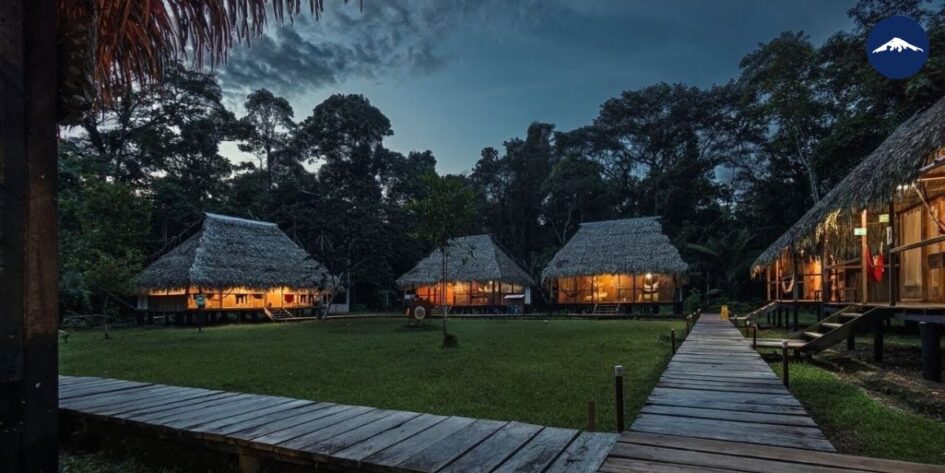
Planning your next holiday is an incredibly exciting time, often spent browsing hundreds of destinations to decide where to enjoy a break from day-to-day life. You may think that once you’ve selected a destination, the rest will fall into place. In reality, with so many sustainable accommodation options to choose from, it can feel overwhelming.
For the eco-conscious individuals among us, many factors go into planning a sustainable trip. From searching for ethical policies to the availability of vegan options, choosing the right accommodation can take a lot of time and research. Fortunately, we’ve compiled all our top tips to help simplify your hunt for eco-friendly options.
Discover sustainable & mindful tours
What kinds of lodging options are commonly considered sustainable?
Homestay Accommodations
It’s a common belief that privately rented accommodation is always a sustainable option but, unfortunately, this isn’t the case. With many large companies and outsiders from the local area now renting out properties, it can be hard to decipher which rentals are truly sustainable options.
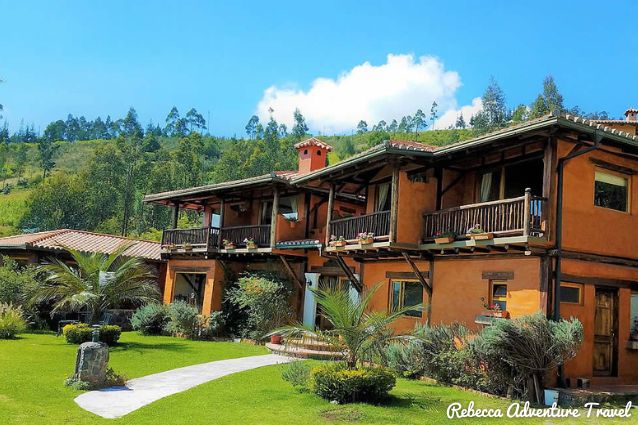
Small House at Ilatoa Lodge
Opting for a homestay is a great way to enjoy the benefits of privately rented accommodation. It also guarantees sustainability, as it involves renting a room in a local home. It can be much more affordable than renting an entire place. By staying with locals, you can get a true taste of the culture, and may even gain some insider knowledge. Browse this website for rooms all over the world!
Small Family-Run Hotels
If a homestay isn’t for you, opting to stay in a small, family-run hotel is another great option. It can be a bit trickier to guarantee a hotel is truly sustainable, but finding one run by local families ensures that your money will be going toward the community.
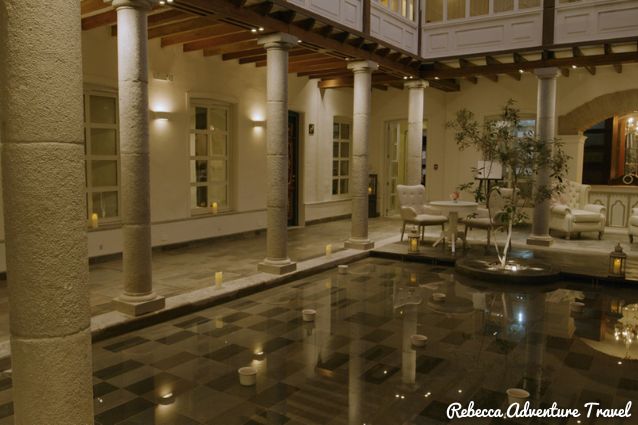
Ilia Family Hotel
Family-run hotels are typically very small, sometimes appearing like a large house with all the amenities you’d expect from a typical hotel. They may also be referred to as B&Bs—offering a bed at night, and breakfast in the morning. The Ecobnb website ranks guesthouses on ecological criteria.
Eco-Friendly Farms
For the more adventurous travelers, shacking up on a local farm is an excellent option. Not only will you be staying in the heart of nature surrounded by wildlife; you’ll have plenty of opportunities to learn about the local food and how it’s made. You may even be lucky enough to sample some fresh, authentic cuisine. Choosing a farm stay presents the perfect chance to broaden your horizons, support the local community, and save money. You can browse Farmstay Planet for farmstays in Europe.
How do I find sustainable accommodation?
Nowadays, there is a website for each kind of travel search you’re doing. These are some specialized ones: Bookdifferent, Earth Changers, Bio Hotels, and Responsible Travel. For more off-the-beaten-track locations, you can always reach out to the local tourism board, and keep an eye out for small-business printed materials advertised in public social areas.
The best options will be specific to the region and country, so take a look at Google Maps. Everyone lists their business there, especially in remote places. The added benefit? Comments and reviews. Here is where online claims get a reality check. Moreover, the biggest booking platforms now have filters for every category discussed here, even country houses, though the legitimacy might be questionable in some cases.
How can I tell if an accommodation is truly sustainable?
Don’t Be Fooled by Greenwashing
Many large corporations will try to make their accommodation appear eco-friendly by flooding their advertisements with buzzwords, without any evidence to back up their claims. It can feel tricky to avoid greenwashing, but a good way to check if their declarations are true is to search for a sustainability section on their website. You could even reach out to ask which of their policies promote sustainability.
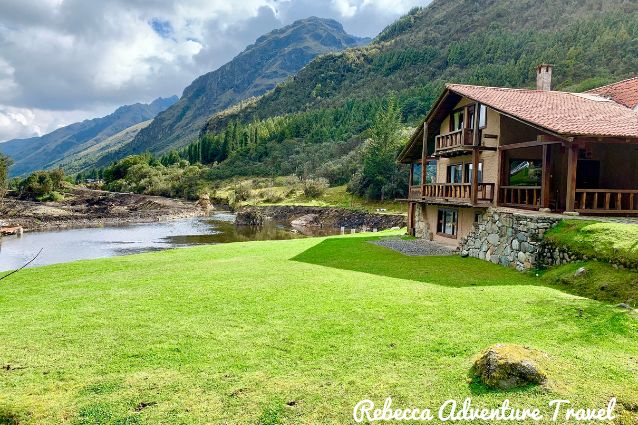
Small sustainable accommodation in Perú
It’s important to do your research rather than just taking a business’ word for its eco-friendliness. As sustainability is becoming a larger concern for many travelers, accommodation providers will often try to take advantage of the trend by making these false claims. This could mean you end up negatively impacting the local environment despite your honest intentions.
Avoid Large Corporations
A good rule of thumb is to avoid large-corporation providers where possible. Although there are a small number of them that do practice sustainability, the large majority are still quite a way behind. To compensate for this, they’ll often employ greenwashing as a strategy. It can be easy to fall for and requires a lot of research to get a true understanding of a business’ climate impact. Instead of spending all of that time researching, it may be safer to opt for one of the low-impact accommodation options mentioned earlier in this blog.
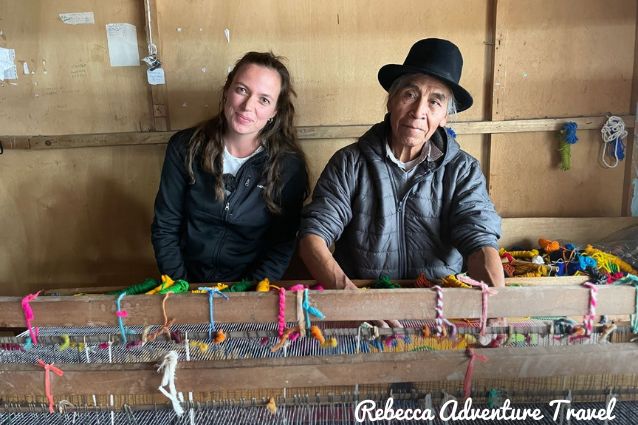
Rebecca supports indigenous artisans in Otavalo
Look Out for International Eco-Certifications
A sustainable business with eco-conscious policies will be able to apply for internationally recognized eco-certifications, such as Green Key and EarthCheck. There are various schemes, each designed for different types of accommodation, ensuring that every provider can work towards their sustainability standards.

Rebecca and Andrés doing voluntary work
Looking out for these certifications can save a lot of time in the research process. Instead of digging through individual policies to ascertain if an accommodation is sustainable, they are quickly identified with one of these eco-certification badges.
Sustainability Checklist
For easy, on-hand revising of a lodging’s sustainable standards, here’s a list of what to check when browsing your options.
- Promotes sustainable practices
- Hires locals
- Sources local produce
- Champions local communities
- Manages waste
- Optimizes energy and water use
- Preserves nature
- Prioritizes responsibility in travel
A golden standard is the offsetting of carbon footprints. Very few businesses and companies are able to do this, which is why it’s not on the list. This is a preferred bonus rather than a general requirement.
Although selecting an ethical and sustainable place to stay on your next trip might seem overwhelming, using these tips can help simplify the process. Whether you end up staying at a local’s home or exploring some of the more luxurious environmentally responsible options, you will have a positive impact on the local community. Simply do your research on sustainable accommodation beforehand.
Written by Dylan Reid
If you would like to receive more information about sustainable tourism and green travel or have any other questions, just contact us. Our destination experts are looking forward to speaking to you!
You might also like:
- Top 5 Family Haciendas around Quito for a Weekend Getaway
- Top 5 Family Restaurants Around Quito
- A Quality and Sustainable Tour Operator




